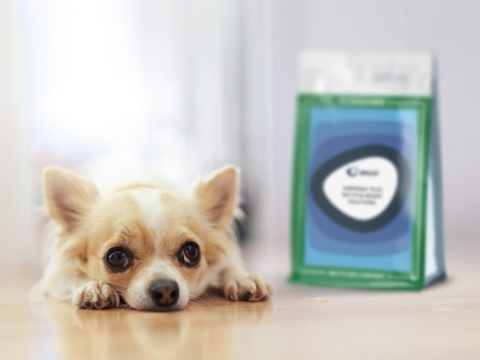
According to a study from Amcor, 69% of pet owners are incentivized to buy pet food if its packaging is designed for sustainability, with 55% influenced by on-pack recyclability claims.
The study sought to learn more about pet owners’ spending decisions – and help pet food brands tailor their products accordingly – by interviewing 1,693 consumers in the UK, France, Germany, and Italy.
Although the product’s health benefits and the buyer’s trust in the brand emerged as the most influential factors in a purchase decision, 76% of respondents noted sustainability as a consideration. More specifically, 69% claimed to consider the recyclability of a product’s packaging.
On-pack recyclability claims were revealed to resonate with consumers the most; coming in second and third were ‘less plastic’ and ‘less packaging’ claims. Only 15% of respondents stated that they are not impacted at all by sustainability messaging.
In response to these findings, Amcor highlights a growing trend of environmental consciousness among pet owners and its impact on a brand’s position in the market. It underlines the importance of clear on-pack messaging to help consumers gauge a sustainability-minded brand from those taking a business-as-usual approach, with recycle-ready packaging said to boost consumers’ trust in a brand.
In another finding, 32% of respondents, or one in three, report that their budget for pet food has not changed despite the European cost-of-living crisis. Instead of purchasing less expensive products, consumers are apparently increasing cost efficiency by investing in larger packs.
Amcor says that transitioning into larger packaging can help brands maintain product quality and shelf life while meeting consumer demand. It recommends its own Single Lip Bag as a potential solution.
“The insights from the research illustrate how influential packaging is for pet food brands,” explains Madalina Mitru, marketing manager at Amcor. “Simply put, it directly drives purchasing decisions. By embracing more sustainable packaging solutions, pet food brands can make a stronger connection with their consumers.
“Amcor launched the first recycle-ready retort pouch available on the wet pet food market – the AmLite HeatFlex Recycle-Ready pouch, and we continue to innovate in dry pet food packaging with our AmPrima portfolio.
“Offering recycle-ready solutions with uncompromised product protection and run speeds, Amcor is committed to developing solutions that align with consumer preferences for both quality and sustainability, helping pet food brands get closer to their sustainability goals and appeal to pet parents.”
This time last year, Howard Wright from Equator Design spoke to Packaging Europe about pet food packaging trends. He noted a rise in recyclable materials, compostable packaging, and biodegradable plastics, as well as detailed labelling keeping owners informed of a product’s nutritional value; this included natural ingredients and an absence of additives.
Meanwhile, another Amcor study revealed that 85% of respondents switched from branded items to a private-label alternative due to rising costs. Within this figure, 50% were satisfied enough with private-label alternatives to keep buying them, and 51% reported finding no difference in quality between the two options.
Sustainability was also said to influence the decision; 33% of respondents felt that retailers could still go further in implementing sustainability-minded packaging solutions. The most popular on-pack claims among consumers were ‘less packaging’, ‘less plastic’, ‘recyclable packaging’, and ‘paper packaging’.
If you liked this story, you might also enjoy:
The ultimate guide to the Packaging and Packaging Waste Regulation in 2024
How are the top brands progressing on packaging sustainability?
Sustainable Innovation Report 2024: Current trends and future priorities
Everything you need to know about global plastic sustainability regulation














No comments yet